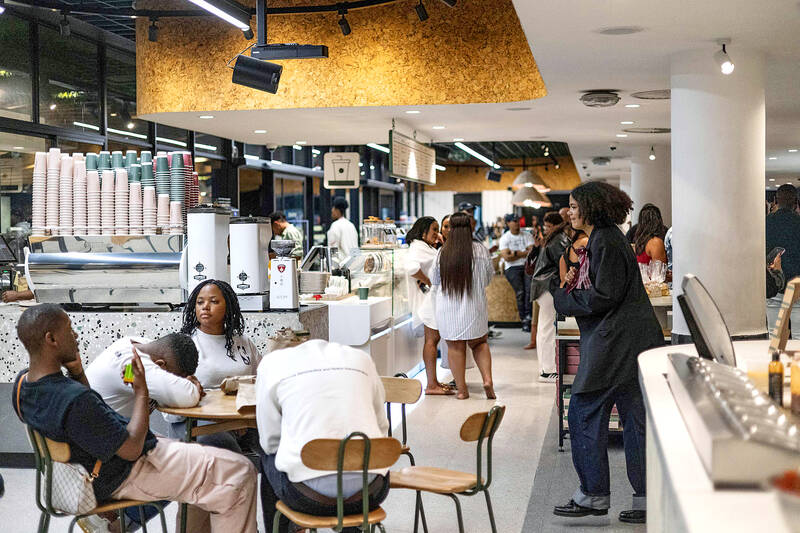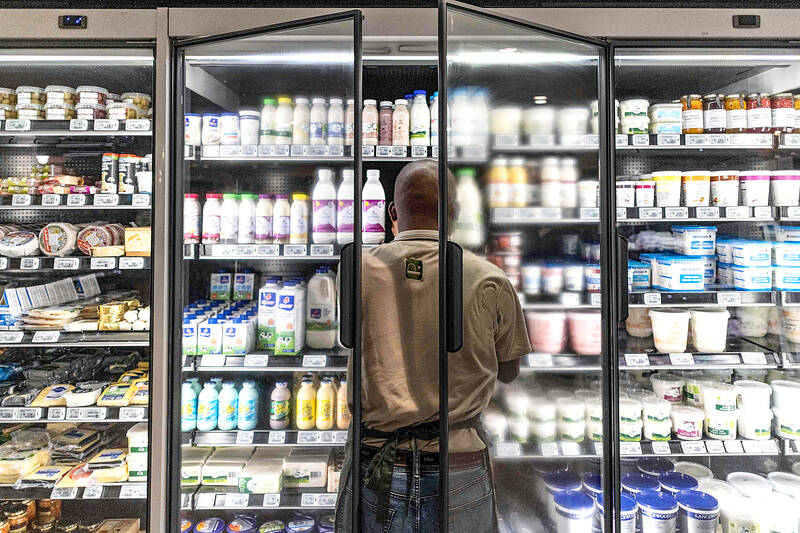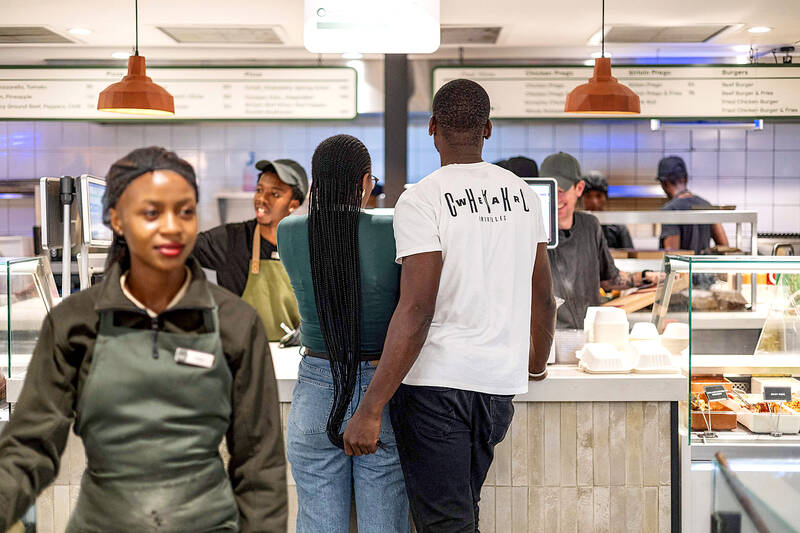From insomniacs to party-goers, doting couples, tired paramedics and Johannesburg’s golden youth, The Pantry, a petrol station doubling as a gourmet deli, has become unmissable on the nightlife scene of South Africa’s biggest city.
Open 24 hours a day, the establishment which opened three years ago is a haven for revelers looking for a midnight snack to sober up after the bars and nightclubs close at 2am or 5am.
“Believe me, we see it all here,” sighs a cashier.

Photo: AFP
Before the curtains open on Johannesburg’s infamous party scene, the evening gets off to a gentle start. On a Friday at around 6pm, families with children flock to the Italian ice cream counter or near the pizza oven. Black, white and Asian, speaking isiZulu, Afrikaans, English or another of South Africa’s 12 official languages, the country’s diversity is mirrored at the dining tables.
Toddling around in twinkling rain boots and wrapped up in his dinosaur pajamas, 18-months old Akani is thrilled.
“We come here every Friday,” smiles his dad, Tony, 33. “He loves the activity and the people watching, seeing so many different people.”

Photo: AFP
Three young queer friends, one of them wearing a pink wig and high-heeled sandals, share coffees and a modest tray of fries.
“This is a good fun place for late nights, it’s always open,” comments Thembiso, a 19-year-old student in a pearl necklace, before a spontaneous photoshoot in the car park, amid the smell of fuel and exhaust fumes.
On the bonnet of a sports car, more modest in their plain shirts and chino trousers, a group of young men are playing cards next to the petrol pumps. They are Muslim, explains a security guard who recognizes the regulars, and as such avoid night spots that serve alcohol.

Photo: AFP
Inside the deli, sparkling wines, chocolates and flower bouquets for 300 rands (US$16) — a small fortune in one of the world’s most unequal countries — share the shelves with the usual petrol station goods: cigarettes, condoms and cool drinks.
As the buzzing workday gives way to a lively Friday night, the diner clientele is slowly replaced by dressed up women with super-long eyelashes, in transparent lace dresses, thigh-high boots, tight latex trousers or cropped tops, browsing the aisles before going out.
‘IT’S JOBURG’
In regular waves, tired staff from nearby hospitals pour into The Pantry.
“I’m on a 24 hour shift, so all-night coffee places are most welcome,” says 28-year-old nurse Jonathan Russell, who is here “on a break.”
Past midnight, the revelers start streaming back in, bringing with them some of the night’s energy. The music has switched from upbeat American pop to the deep feverish basslines of local Amapiano.
A tipsy young woman raises her arms to the ceiling, nodding her head in tune as she shuffles through the aisles.
“We pass here on our way home. If there is drinking, Pantry is involved,” says Lerato, a 26-year-old banker in a light blue pressed shirt.
Two girlfriends come staggering in. Yanga, wearing linen shorts, orders a pizza: “We went to two different bars. I will have a hangover tomorrow,” says the 34-year-old who works in IT. “I want something warm and consistent,” sighs Naki, a 30-year-old architect.
In the queue, a tall man is courting a bustier-clad young woman, who answers his questions with curt responses.
“You get the drunk selfies now,” smiles a cashier. “And people coming for their munchies, it’s a vibe.”
Suddenly, two fuel-guzzling SUVs pull up. Five colossal bodyguards climb out, revolvers tucked into their waistbands. One of them cradles an assault rifle in his arms as a chic woman with long braids passes through, wearing Gucci flip-flops and a floaty summer dress.
“We get all the celebrities here. They come after their gigs and events,” comments 43-year-old security guard Alfred Mathibe.
In this case, “she’s just rich,” he says. Seeing firearms in the parking lot is nothing out of the ordinary. “We see it all the time,” Mathibe shrugs. “It’s Joburg, baby!”
Shortly after 4am, the pastries section is back in stock. Daylight will soon be here, along with clean-shaven customers. Johannesburg is waking up.

Behind a car repair business on a nondescript Thai street are the cherished pets of a rising TikTok animal influencer: two lions and a 200-kilogram lion-tiger hybrid called “Big George.” Lion ownership is legal in Thailand, and Tharnuwarht Plengkemratch is an enthusiastic advocate, posting updates on his feline companions to nearly three million followers. “They’re playful and affectionate, just like dogs or cats,” he said from inside their cage complex at his home in the northern city of Chiang Mai. Thailand’s captive lion population has exploded in recent years, with nearly 500 registered in zoos, breeding farms, petting cafes and homes. Experts warn the

The unexpected collapse of the recall campaigns is being viewed through many lenses, most of them skewed and self-absorbed. The international media unsurprisingly focuses on what they perceive as the message that Taiwanese voters were sending in the failure of the mass recall, especially to China, the US and to friendly Western nations. This made some sense prior to early last month. One of the main arguments used by recall campaigners for recalling Chinese Nationalist Party (KMT) lawmakers was that they were too pro-China, and by extension not to be trusted with defending the nation. Also by extension, that argument could be

Aug. 4 to Aug. 10 When Coca-Cola finally pushed its way into Taiwan’s market in 1968, it allegedly vowed to wipe out its major domestic rival Hey Song within five years. But Hey Song, which began as a manual operation in a family cow shed in 1925, had proven its resilience, surviving numerous setbacks — including the loss of autonomy and nearly all its assets due to the Japanese colonial government’s wartime economic policy. By the 1960s, Hey Song had risen to the top of Taiwan’s beverage industry. This success was driven not only by president Chang Wen-chi’s

Last week, on the heels of the recall election that turned out so badly for Taiwan, came the news that US President Donald Trump had blocked the transit of President William Lai (賴清德) through the US on his way to Latin America. A few days later the international media reported that in June a scheduled visit by Minister of National Defense Wellington Koo (顧立雄) for high level meetings was canceled by the US after China’s President Xi Jinping (習近平) asked Trump to curb US engagement with Taiwan during a June phone call. The cancellation of Lai’s transit was a gaudy